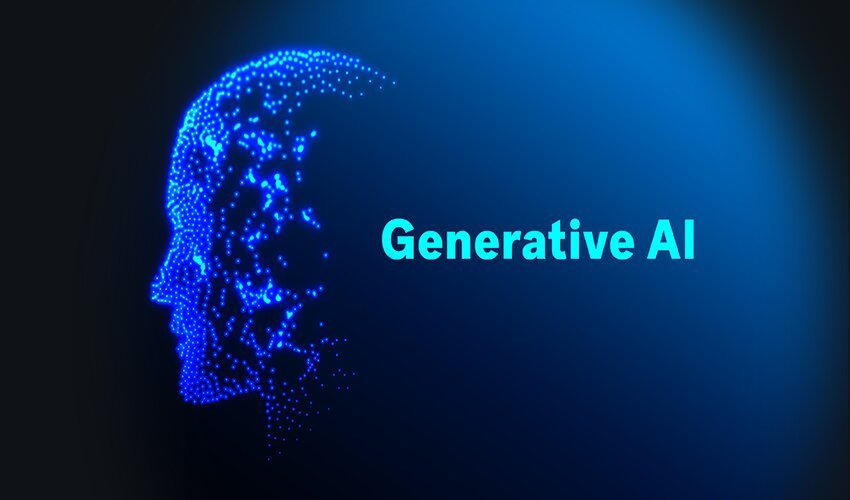
In the area of the quickly continuing digital atmosphere, the field of Artificial Intelligence (AI) has created important developments through the appearance of generative AI algorithms. These algorithms possess a noteworthy capability to produce novel material, encompassing photos, music, and textual compositions, which exhibit an indistinguishable quality from works generated by humans.
Generative Artificial Intelligence (AI), also referred to as creative AI or deep generative models, has brought about a significant transformation across many sectors, including art, design, music creation, and narrative. The advent of this development has presented novel opportunities and incited a surge of inventive thinking, enabling artists to explore the limits of their imagination in unprecedented ways.
The main aim of generative AI is to make content, which is different from other kinds of AI, they are also useful for many other reasons like analyzing data or assisting in controlling data. ChatGPT has garnered significant popularity, collecting a user base of over one million individuals within a week after its first introduction.
Market and Statistic Conditions for Generative AI
In light of the current economic climate characterized by heightened uncertainty and widespread layoffs across several sectors, corporate leaders are challenged with the difficulty of determining the main areas for cost reduction and strategic investment. The predicted growth rate of the market is projected to be 32.65% annually from 2023 to 2027. According to the prediction, there is an anticipated growth in the market size, with an estimated rise of USD 34,695.37 million.
Facilitating the Process of Creative Inquiry
A wide range of opportunities for the pursuit of creative inquiry are presented by the application of generative Artificial Intelligence (AI). These technologies provide designers and artists with a way to access their creative capacities and break free from traditional constraints. Generative AI algorithms can generate a diverse array of outputs by specifying certain parameters or desired styles. This ability facilitates the emergence of novel ideas and the exploration of unconventional creative forms, hence expanding the bounds of traditional artistic expression.
Approximately 90% of the tasks are executed with a high level of efficiency. It enables the marketing staff to allocate their attention towards creating and disseminating content on social media platforms. Consider the potential time savings associated with the process of generating novel ideas and effectively involving all participants in a Zoom meeting, regardless of the outcomes achieved. Once a comprehensive understanding of the tool’s functionality is achieved, it becomes possible to effectively target various client categories via the delivery of new and engaging content.
The potential risks and prospects associated with Generative Artificial Intelligence (AI) are today’s main concern:
- Indeed, it is important to acknowledge that generative AI also presents significant risks and obstacles.
- One potential issue is the potential misuse of this technology for the production of fabricated news articles or propaganda, as well as the creation of unreal videos that possess a high degree of realism, making them difficult to differentiate from genuine material.
- There are additional apprehensions about the prospective ramifications of generative AI on work since it can automate several occupations that need originality and inventiveness. Nevertheless, these obstacles and the potential advantages of generative AI are immense.
- Generative Artificial Intelligence (AI) systems, exemplified by deep learning models such as GPT-3, can produce remarkably persuasive material that emulates human creativity. Nevertheless, these systems are heavily dependent on extensive training data, which renders them susceptible to biases and exacerbates the prevailing social and cultural preconceptions inherent in the data. The hazards associated with the use of generative AI tools are further exacerbated by their high accessibility, enabling anyone with low technical expertise to employ them for malicious intentions.
- The potential misuse of generative AI models, including their complex functionalities like coding, raises significant cybersecurity worries. The question of copyright poses unique challenges for works of art created by AI in any form, including photographs and musical compositions.
How can Companies Overcome Generative AI glitches?
- Bias and Ethical Considerations
Generative Artificial Intelligence (AI) models can gain knowledge via the use of training data. However, it is important to acknowledge that this process might inadvertently perpetuate biases and discriminatory tendencies within the produced output. To effectively tackle this matter, enterprises must thoroughly deliberate about the process of data selection and preparation. Organizations have the potential to promote equity and inclusiveness by integrating a wide array of training data sources and actively working towards mitigating prejudice.
- Intellectual Property and Copyright
The issue of intellectual property and copyright violation arises because of the probable similarity between the material created by generative AI models and existing works. To address these risks, organizations need to implement preventive steps. Businesses may effectively protect themselves from legal complications and maintain their image by exhibiting a strong commitment to respecting these copyright regulations.
- Enhanced Data Annotation
Generative Artificial Intelligence (AI) systems have the potential to contribute to the automation of annotating training data, hence lowering the time and resources needed for data preparation in the context of machine learning. It even helps firms to For instance, enhance operational efficiency, minimize expenses, and foster innovation.
Author Bio:
I am Ethan Millar and I work for Aegis Softtech. I am a Business Analyst as well as an experienced developer. The use of generative AI consulting services may be of tremendous advantage to businesses across a wide range of sectors. Overall, the rise of generative AI brings both exciting opportunities and ethical challenges.
